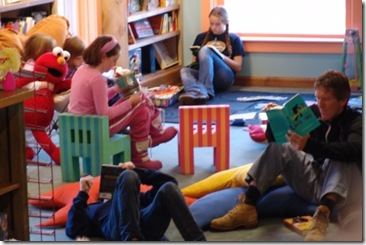I’ve spent the last two days in Chester, Vermont, at Misty Valley Books Fresh Voices 2010, a remarkable weekend-long event that showcases new authors to the community. Lynne and Bill Reed, owners of the bookstore, have run this event for years and have done an amazing job bringing authors and the public together for a weekend of food, drink, conversation and fun.
It was also the first time that Elysha and I left our daughter overnight, but we’ve been receiving photos from her grandparents all weekend long and she is doing remarkably well.

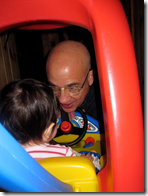
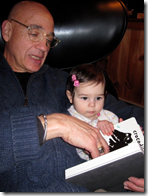
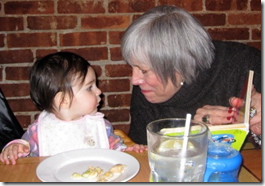

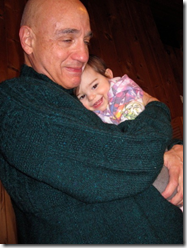

Too well, in fact. It would seem that we were not the center of her universe after all. I find myself both pleased and a little angry by her lack of crying all weekend.
Doesn’t she know what she’s missing?
It’s now 5:30 AM on Sunday morning and I find myself in the lobby of the hotel adjacent to the bookstore, sitting at a small table, pecking away at my keyboard while everyone else still sleeps. In a few hours Elysha and I will leave Chester to pick up our daughter, and while I can’t wait to see Clara, it’s a little sad that such an enjoyable weekend is coming to an end.
Some of the highlights included:
On Saturday morning, in temperatures near zero, we spent a couple hours cross country skiing at Grafton Ponds. It was the first time that any of us had been on cross country skis, so our instructor, Betsy, spent the entire time with us, teaching the finer points of the sport. I am happy to report that I didn’t fall once, though I was clearly the worst skier of the bunch, no matter what Heidi Durrow might tell you. I couldn’t strap on my skis without assistance, I heard my name shouted more than any other and I was asked at one point if I “often have a hard time with athletic activities.”
Still, I’ll do it again, hopefully when it’s a little warmer.
I thought it was a little odd for Bill and Lynne to send four authors out for a cross country ski lesson together, wondering how it fit into such airy and lofty topics as literature and writing and publishing. But I soon realized the method behind their madness. By strapping long sticks onto four nervous authors’ feet and sending them out sliding across snow and ice together, we bonded in a way that could have never happened had we hung around the hotel all day, waiting for our opportunity to speak. Thrust a handful of strangers into a new situation and they must immediately rely upon one another for support, humor, comfort and survival. This is exactly what happened. We arrived at Grafton Ponds that morning as five authors who knew a little bit about one another but left with burgeoning friendships.
We’ve also had the opportunity to spend time with the Chester community, first at dinner on Friday night in the home of Lynne and Bill, then at Grafton Ponds, where the public was invited to join us, and later at a reception following our readings and dinner on Saturday night. It’s an engaging and welcoming community that opened their doors to us and made us feel right at home.
But the highlight of the weekend was getting to know the four other authors who I was fortunate enough to join on this adventure. Each is a gifted writer and an impressive human being. On Saturday afternoon we made our way to the Stone Church to speak to a packed house. It was terrific. Each presentation was remarkably unique and interesting and thoroughly captivated me, and this is saying something. I find many authors to be dry, dusty, and terrified when they stand before a large audience, but not these four.
Deborah Copaken Kogan, a no-nonsense writer, photographer, and former war correspondent, talked about the journalistic approach that she took to her first novel, which is based upon the murder of her childhood friend. From all accounts, it’s a beautifully written and haunting novel that I am both anxious and afraid to read, given my new-father status and my newfound sensitivity to stories like this.
Elena Gorokhova, a Russian immigrant who studied English while at the University of Leningrad, discussed her memoir about life in the Soviet Union before Perestroika with humor and insight that could only come from someone living there at the time. My wife has already decided to choose her book for our next book club selection.
Heidi Durrow, winner of the Bellwether Prize in Fiction and doing the first reading of her career (her book officially comes out next month), spoke with remarkable skill and flair, convincing me that she should have been the one to record the audio book version of her novel. While I’m looking forward to reading her book, I wish that she would read it to me. She was that good.
Jim Landis, a gifted writer and thinker, spoke in a way that left you laughing, thinking, and pondering the nature of man and religion, all while remaining highly entertained. Not an easy task. His book reportedly has a surprise ending, but the beginning section that he read to us was enough to hook me. I started his book tonight.
I am honored to think of each one of these authors as my peers, colleagues and friends, and plans are already in the works to return to New Voices 2011 next year, so that we can sit in the pews at the Stone Church and listen to another batch of Bill and Lynne’s new authors share their stories with us.
Betsy even promised to give Clara her first skiing lesson, too.
If you’re interested in these author’s books (and you really should be), they are:
Jim Landis: THE LAST DAY
Heidi Durrow: THE GIRL WHO FELL FROM THE SKY
Deborah Copaken Kogan: BETWEEN HERE AND APRIL, as well as her bestselling memoir SHUTTERBABE and HELL IS OTHER PARENTS
Elena Gorokhova: A MOUNTAIN OF CRUMBS
And please allow me to add Denise Landis (Jim’s wife) and her cookbook, DINNER FOR EIGHT to the list.
And if you find yourself in Chester, Vermont in need of a book or a warm place to browse, be sure to stop by Misty Valley Books. In addition to a fine selection of books, Bill and Lynne also give French lessons and sell magic carpets, children’s puzzles (we bought one for Clara that I cannot reassemble), local art, and calendars of every shape and size.
Be sure to ask Bill to see his Mr. November photo from this year’s calendar. You’ll be glad you did.








 by Matthew Dicks
by Matthew Dicks